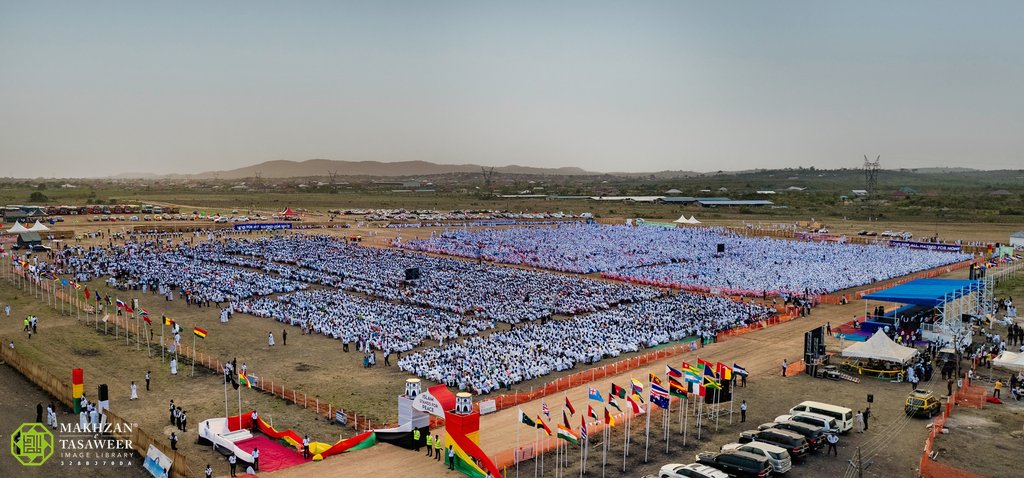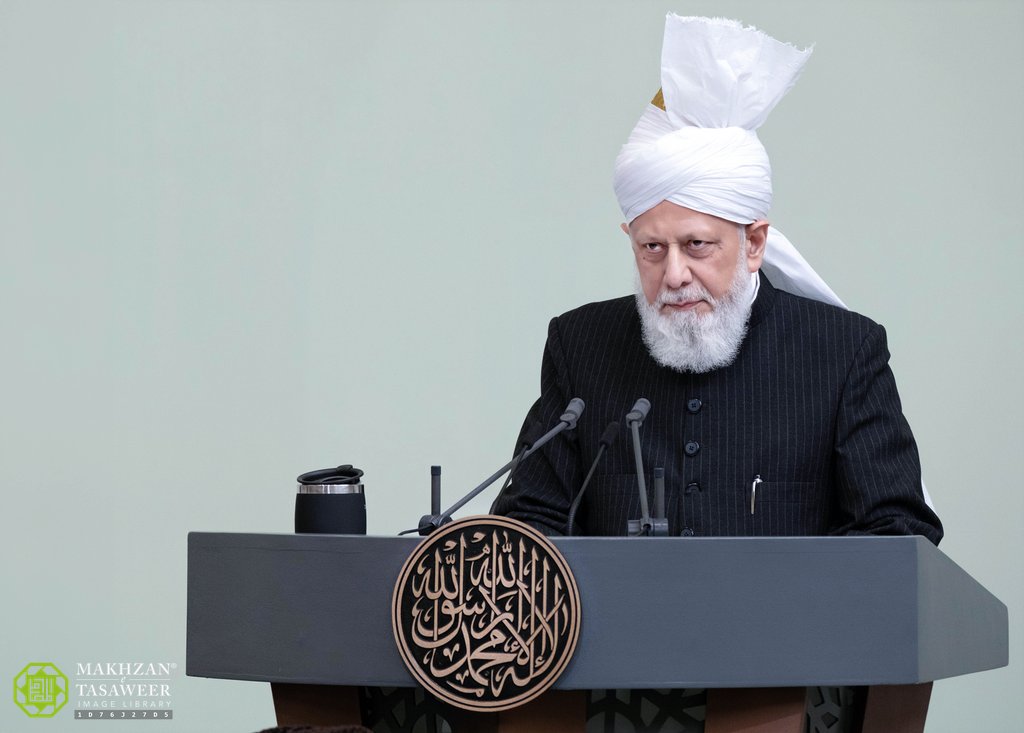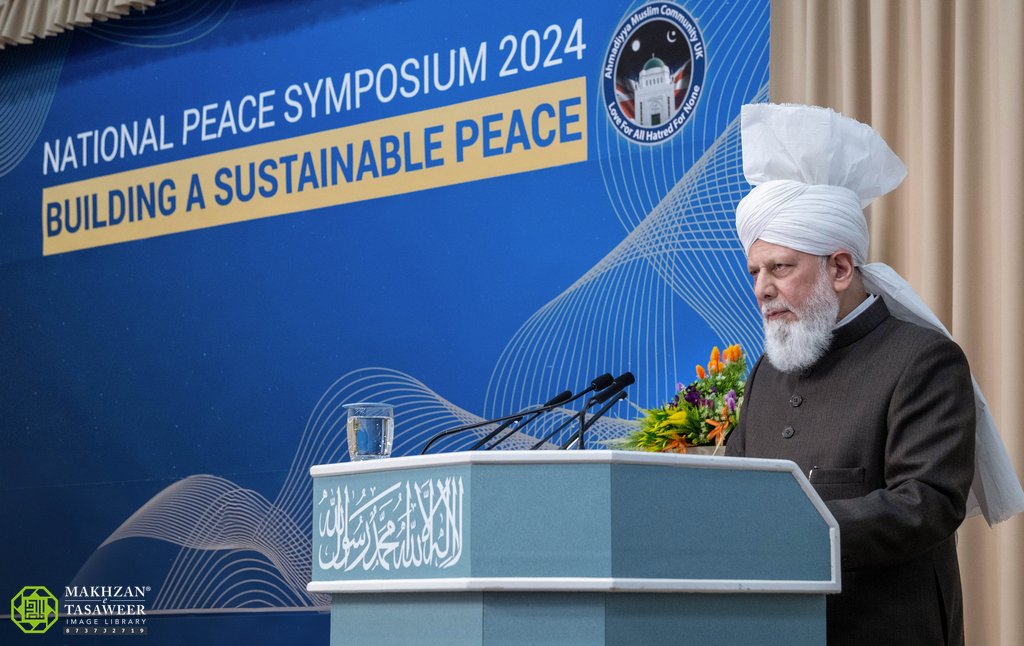
Global Muslim Leader Calls For Ceasefire In Gaza And Ukraine, Says Privileged Nations Are Wielding Their Veto ‘Like A Trump Card’
“The fate of the United Nations seems set to mirror that of its failed predecessor, the League of Nations”
“Where a veto power exists, the scales of justice can never be balanced”
“If we stand by and let these wars escalate further… history will judge us with contempt as the authors of our own destruction and misery”
– Hazrat Mirza Masroor Ahmad
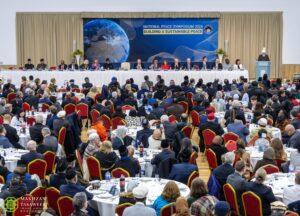
On 9 March 2024, the World Head of the Ahmadiyya Muslim Community, the Fifth Khalifa (Caliph), His Holiness, Hazrat Mirza Masroor Ahmad delivered the keynote address at the 18th National Peace Symposium hosted by the Ahmadiyya Muslim Community UK.
The event was attended by more than 1,200 people including more than 550 dignitaries and guests who had gathered from 30 countries, comprising of Ambassadors of State, Members of Parliament and academics.
During the proceedings, His Holiness presented Adi Patricia Roche, founder of Chernobyl Children International (CCI), recognised for her long-lasting post-Chernobyl disaster efforts, with the 2020 Ahmadiyya Muslim Prize for the Advancement of Peace.
His Holiness also presented David Spurdle, founder of the charity Stand By Me, with the 2023 Ahmadiyya Muslim Prize for the Advancement of Peace, for his remarkable support for orphans and underprivileged children across the world.
As he began his address, His Holiness mentioned that for for over two decades he has repeatedly urged policymakers to work towards “peace and harmony of the world.”
Highlighting the importance of learning lessons from history, Hazrat Mirza Masroor Ahmad said:
“History teaches us that internal conflicts can spiral into regional wars – often fuelled by the interference and influence of external powers who ferment instability and division in other countries to serve their interests. In recent decades, we have witnessed the devastating consequences of such interference in countries such as Kuwait, Iraq, Syria and Sudan.”
His Holiness mentioned that he has warned of how unjust policies of major powers are “triggering an ever-rising tide of inequality” leading to global insecurity.
His Holiness stated that many intellectuals and policymakers had previously held the impression that His Holiness was wrong to believe that existing conflicts could escalate into a global war and even trigger the use of nuclear weapons, considering it to be “unnecessarily pessimistic.”
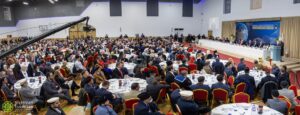
Commenting on those who held such views, Hazrat Mirza Masroor Ahmad said:
“Either due to their idealism and a desire to look at the world through rose-tinted glasses or perhaps due to an incapability to learn lessons from history, they seemingly ignored the widening cracks that have been opening up in recent decades in international relations. Perhaps, they simply did not wish to accept the reality of what was staring them in the face. As they say, ‘ignorance is bliss’.”
His Holiness stated that although many of the same people are now raising the alarm warning of a world war, in which nuclear weapons could wreak unimaginable devastation, “many still seem unwilling to consider what must be done to end these conflicts and remain reluctant to hear the genuine voices for peace that exist in the world.”
Because those with the power to influence seemed unwilling to sincerely work towards lasting peace, His Holiness said he had questioned whether there was any point in reconvening for the event once again to speak of the urgent need for peace. However, he determined to proceed “because Islam teaches Muslims never to waver in the pursuit of peace.”
His Holiness said that “to speak truthfully and courageously before one’s leaders, especially those who are hard-hearted, unjust and cruel” is in fact the greatest form ‘Jihad’ as stated by the Holy Prophet of Islam, Muhammad (peace and blessings of Allah be upon him).
His Holiness reiterated that the Ahmadiyya Muslim Community continues to use all the means available to work towards establishing peace in the world, and will continue to do so without fear of any sanctions.
Turning towards the role of the United Nations, which he referred to as a “weak and almost powerless body,” Hazrat Mirza Masroor Ahmad said:
“Instead of deciding each issue based on its facts and merits, nations have formed alliances and vote according to their self-interests. Ultimately, critical decisions are made by a few privileged nations in whose hands rest the veto power. Instead of faithfully serving the cause of peace and justice, they wield their veto like a trump card wherever their narrow interests are threatened, irrespective of whether their decision shatters the peace and prosperity of other nations and leads to the death and destruction of scores of innocent people.”
Hazrat Mirza Masroor Ahmad continued and said:
“Where a veto power exists, the scales of justice can never be balanced… Regrettably, due to its inherent lack of justice, the fate of the United Nations seems set to mirror that of its failed predecessor, the League of Nations. And, if the system of international law, weak as it may be, completely collapses, the resulting anarchy and destruction is beyond our comprehension.”
During the address, His Holiness explained how the teachings of Islam in relation to warfare and the creation of peace are extremely important today at a time when several wars are being fought where these principles are not being adhered to.
His Holiness explained that although in extreme circumstances, the founders of the major religions, including the Holy Prophet Muhammad (peace and blessings be upon him), permitted the use of limited force, it was always “solely with the intention of ending warfare and oppression.”
Referring to the teachings of the Holy Quran, Hazrat Mirza Masroor Ahmad said:
“In chapter 42, verse 41 of the Holy Quran, Allah the Almighty commands that where a person or nation has been wronged, they must never respond disproportionately or stray into realms of seeking revenge. Furthermore, Allah says that it is better to forgive if it can lead to reformation. Chapter 49, verse 10 of the Holy Quran, says that if two nations are at war, neutral parties should mediate between them and strive to establish peace based on the principles of justice and equity.”
Hazrat Mirza Masroor Ahmad further stated:
“If having reconciled, one party violates the terms of the agreement and again resorts to warfare, other nations should forcefully unite against the aggressor until it desists from its aggressive conduct. Once it stops, the other nations must also cease using force. The objective should always remain to build sustainable peace underpinned by justice. It should not be that a third party takes advantage of the vulnerability of the warring parties by usurping their rights for his own benefit.”
His Holiness said if these principles were observed by the United Nations and other relevant bodies, “conflicts would be resolved far more amicably and swiftly.”
Turning to the present-day conflicts, His Holiness said that just like the Russia and Ukraine war, the conflict between Israel and Palestine is also “geopolitical and territorial” as opposed to being a religious war.
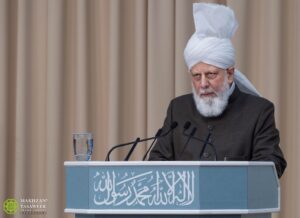
Hazrat Mirza Masroor Ahmad said:
“I firmly believe there is only one way to end these wars – by ensuring that justice prevails and that whatever settlements are made are based on equity, as opposed to what better serves the interests of external powers.”
Commenting once again on the perils of the veto power and its role in the present conflicts, Hazrat Mirza Masroor Ahmad said:
“In terms of the Ukraine war, Russia has a veto power at the UN Security Council, whilst, in effect, Ukraine also has one by virtue of its alliance with those Western nations who have permanent membership of the Security Council. How can a settlement be agreed if both sides can effectively wield a veto?”
Hazrat Mirza Masroor Ahmad further stated:
“As for what is happening in Gaza, though both the Israelis and the Palestinians have their supporters, the veto power has only been used in Israel’s favour since the current war ignited several months ago. For example, in February, 13 out of 15 members of the UN Security Council voted in favour of an immediate ceasefire in Gaza but the United States utilised its veto power and the Resolution was defeated. How can peace be established where the majority view is so easily discarded? That is not justice – instead, it is a rejection of democracy and the principle of equality.”
Shining light on the teachings of Islam, His Holiness referenced chapter 5, verse 9 of the Holy Qur’an which states that the enmity of any nation or people must never incite one to deviate from the path of justice or fairness.
Hazrat Mirza Masroor Ahmad stated:
“Even non-religious people will surely recognise the wisdom and benefit of adopting this pre-eminent standard of justice.”
Thereafter, His Holiness addressed the allegation of Islam being an extremist religion and highlighted that even where Islam permitted defensive war, it set strict conditions that must be adhered to.
Among the conditions set by the Holy Prophet Muhammad (peace and blessings be upon him), His Holiness presented the conditions that wars must never be fought to “conquer lands or to establish supremacy over others. Rather, Muslims were only permitted to fight if war was waged upon them.”
Hazrat Mirza Masroor Ahmad spoke of protecting the sanctity of all places of worship and said:
“Islam also teaches that unless one’s opponent uses a place of worship as a military base, it is not permissible to violate the sanctity of a place of worship by fighting within it or even near it. It is strictly forbidden to knock down or desecrate the places of worship of your opponents.”
Further explaining the teachings of Islam, Hazrat Mirza Masroor Ahmad said:
“The Holy Prophet of Islam (peace and blessings of Allah be upon him) also prohibited Muslim soldiers from inflicting any form of terror or fear amongst the general public during wars. Indeed, all non-combatants and civilians were to be treated kindly and no injustice was to be perpetrated against them… During battle, soldiers should not strike their opponents in the face and should cause them the least possible harm and distress. If prisoners of war were caught, they were not to be separated from their relatives if they too were imprisoned.”
His Holiness further stated:
“Every effort was to be made to make prisoners of war comfortable to the extent that their comfort and needs were to be prioritised over those of the captor. If a Muslim was guilty of any form of cruelty or harshness towards a prisoner of war, they were to release him immediately to make amends.”
Highlighting the universality of these Islamic principles, His Holiness said that if non-Muslim nations adopted these principles, then “even if wars occurred, they would not lead to such deep-rooted enmities forming that remained embedded generation after generation.”
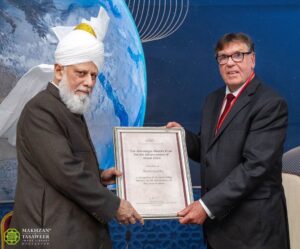
His Holiness warned that by failing to recognise that peace can only be established if these principles of war are acted upon, “we lie at the precipice of a catastrophic global war that will undoubtedly lead to such immense levels of destruction and carnage that lie far beyond our imagination.”
His Holiness quoted Professor Jeffrey Sachs, world-renowned economist from Columbia University who attributed blame to the “failure of Western political leaders to be forthright about the causes of the escalating global conflicts” for being on the precipice of a nuclear catastrophe.
Professor Sachs accused the West and its narrative of boasting nobility whilst depicting Russia and China as evil to be “simple-minded and extraordinarily dangerous” and said, “At this stage, diplomacy, not military escalation, is the true path to European and global security.”
Turning to the grave humanitarian situation in Gaza, His Holiness quoted a recent interview of US Senator Bernie Sanders, who strongly condemned the actions of the Israeli government, describing them as “unspeakable” and said that “we in the United States, through our financial support of Israel are complicit in what’s happening.”
The Caliph of the Ahmadiyya Muslim Community stated that he took no satisfaction in the fact that politicians and commentators were now reaching the same conclusions that he had long warned the world about for over two decades. Rather, he felt only regret that necessary efforts had not been made to bring an end to inequality, injustice and warfare.
Hazrat Mirza Masroor Ahmad called for a cessation of the two major wars raging currently and said:
“Certainly, it is my opinion that there should be a full ceasefire between Israel and Hamas and also in the war between Russia and Ukraine. Thereafter, instead of inciting their respective allies towards further warfare, all members of the international community should prioritise ensuring relief efforts are stepped up to help those in desperate need and focus on bringing about a lasting and peaceful settlement.”
Warning of how future generations will blame us if we stand by whilst cruelties are perpetrated, Hazrat Mirza Masroor Ahmad said:
“If, instead, we stand by and let these wars escalate further, countless more innocent lives will be lost, and, surely, history will judge us with contempt as the authors of our own destruction and misery.”
Hazrat Mirza Masroor Ahmad concluded and said:
“We must all come together, setting aside national, political, and other vested interests for the greater good of humanity and to ensure that we leave behind a prosperous world for our future generations. It is the need of the time that we must focus all our energies and efforts on establishing true peace so that we may live in a world of hope and prosperity, rather than a world defined by inequality, hatred and bloodshed.”
Prior to His Holiness’ address, several dignitaries addressed the audience including the winners of the Ahmadiyya Muslim Prize for the Advancement of Peace, as well as the National President of the Ahmadiyya Muslim Community in the UK, Mr Rafiq Hayat.
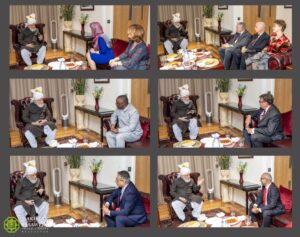
Representatives of several political parties also addressed the Peace Symposium.
Dame Siobhain McDonagh MP spoke and said:
“The Ahmadiyya community has been at the forefront of calling for peace since the very start of the conflict. It is his holiness who urged all world powers to de-escalate and work towards a lasting peaceful solution”
Jonathan Lord MP said:
“Your commitment (the community) to promoting peace, justice and tolerance across the world, is truly commendable…In the face of such uncertainties in the international situation, Your Holiness, and your Community have been true beacons of peace, reminding us of the values that should unite us all.”
RT Hon. Sir Ed Davey, Leader of the Liberal Democrats party said a bilateral ceasefire is needed in Gaza “so the killing can stop, so the aid can get in, so the hostages can be released, so we can start a peace process that gets to the Two-State solution that could be offered. And, I’m looking forward to His Holiness’ speech to talk about what’s happening and how we can play our role – all of us – play our role.”
